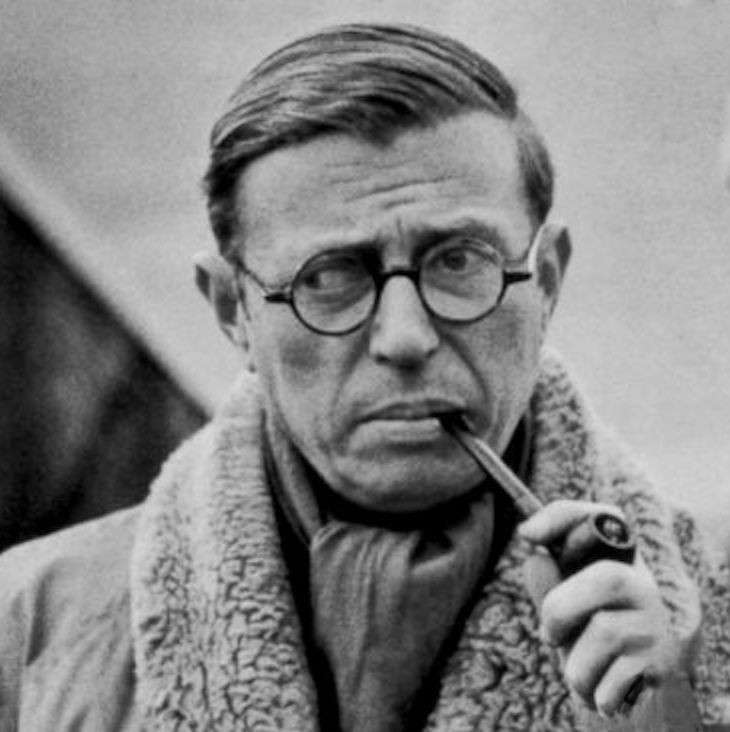Jean Paul Sartre
The Nothingness At The Heart Of His Philosophy
Empowering perspectives undermined by intellectual arrogance and spiritual ignorance
Jean Paul Sartre - An Overview
Jean Paul Sartre (1905–1980) is one of the better known philosophers of the twentieth century.
He will always be remembered for his espousal and advocacy of the existentialist philosophical perspective. Alongside Simone de Beauvoir, and Albert Camus he is rightly regarded as one of the leading lights of this modern movement.
At root, existentialism:
- Views human existence as having no meaning other than that which you choose to give it, and
- Is about living life authentically by making your own choices for which you alone accept total responsibility.
Sartre the Existentialist
His writings and lectures set the tone for intellectual life in the decade immediately following the Second World War as existentialism gained traction and became fashionable in the mid-20th century which was the post-war era of the rejection of absolutism, and a period of systemic challenges to the political and societal status quo. It was also the time of the emergence of the “swinging sixties”.
Existentialism provided a language for what was seen as the problem of life as a human being faced with a bewildering array of choices, in a world of absurdity devoid of any inherent meaning, and for which you hold total responsibility.
Jean Paul Sartre was born in Paris, where he lived for most of
his life. He studied philosophy at École Normale
Supérieure until 1929 when he met the existentialist feminist
philosopher with whom he enjoyed a lifelong partnership.
He spent most of the 1930s teaching in the northern French port city of Le Havre, until he was drafted into the French army at the outbreak of World War II in 1939 and where he served as a meteorologist but was captured and held as a prisoner of war until 1941.
After returning to German-occupied Paris, he had some limited involvement with the underground resistance to the occupation and wrote many of his best-known works, including "Being and Nothingness", the plays "No Exit" and "The Files", and the novel "The Age of Reason".
Sartre the Marxist
In 1946 he quit teaching and from this period onward, Jean Paul Sartre’s work and public image became far more political and particularly anti-colonial in tone. He became a committed Marxist.
Sartre the humanist
In 1945 Jean Paul Sartre delivered what has become his famously popular public lecture “Existentialism is a Humanism”
to an eagerly receptive crowd in Paris on 2th Oct 1945.
The transcript and analysis of this lecture continues to be the major introduction to his philosophy tom a non-specialist general audience.
Sartre allegedly regretted the publication of this lecture as it revealed his attempt to widen the social application of existentialism in response to his Communist and Catholic critics.
For a key point summary of existentialism [in simple English] together with a closer look at some of it's big ideas and their weaknesses and a practical assessment of how this aligns with the key themes on this site please see: Existentialism
Sartre the Christian
It is interesting to observe that in his last days Sartre could not live with the consequences of his own atheist existential beliefs and he became a Christian believer and called for a priest...
Resources:
The academic view of Jean Paul Sartre:
Stanford University Encyclopedia Of Philosophy
Criticism of Jean Paul Sartre:
Jean-Paul Sartre - The nothingness at the heart of his philosophy
The academic view of existentialism:
Stanford University Encyclopedia Of Philosophy
"...his philosophy was never felt, but all a pose."
[Clive James]
Return to: Existentialism
LATEST ARTICLES
The Kingdom Is Here, Now Awakening Is Not Later -
 What contemplative traditions point to - and how progress quietly replaces presence. Across contemplative traditions, a strikingly consistent message appears: truth is not somewhere else, not in the…
What contemplative traditions point to - and how progress quietly replaces presence. Across contemplative traditions, a strikingly consistent message appears: truth is not somewhere else, not in the…Does Prayer Work? The Psychology of Prayer, Meditation and Outcomes
 Reality Is A Complex System Of Countless Interactions - Including Yours. So does prayer work? The problem is that the question itself is usually framed in a way that guarantees confusion. We tend to a…
Reality Is A Complex System Of Countless Interactions - Including Yours. So does prayer work? The problem is that the question itself is usually framed in a way that guarantees confusion. We tend to a…Living in Survival Mode Without Surrendering Mental Authority
Living in Survival Mode Without Surrendering Mental Authority
 Clear Thinking When You’re Just Trying to Stay Afloat. Many people today are overwhelmed because they are living in survival mode - not temporarily, but as a persistent condition of life. For many, th…
Clear Thinking When You’re Just Trying to Stay Afloat. Many people today are overwhelmed because they are living in survival mode - not temporarily, but as a persistent condition of life. For many, th…Manifestation Without Magic: A Practical Model
 Manifestation without magic is not a softer or more intellectual version of popular manifestation culture. It is a different model altogether. Popular manifestation teachings tend to frame reality as…
Manifestation without magic is not a softer or more intellectual version of popular manifestation culture. It is a different model altogether. Popular manifestation teachings tend to frame reality as…Staying Committed When You Can't See Progress - The Psychology of Grit
 Uncertainty Is Not The Absence Of Progress, Only The Absence Of Reassurance. One of the most destabilising experiences in modern life is not failure, but uncertainty and staying committed when you can…
Uncertainty Is Not The Absence Of Progress, Only The Absence Of Reassurance. One of the most destabilising experiences in modern life is not failure, but uncertainty and staying committed when you can…The Battle For Your Mind - How To Win Inner Freedom In A Digital Age Of Distraction
 From External Events to Inner Events. We often think of “events” as things that happen out there: the traffic jam, the rude comment, the delayed email reply. But what truly shapes our experience is wh…
From External Events to Inner Events. We often think of “events” as things that happen out there: the traffic jam, the rude comment, the delayed email reply. But what truly shapes our experience is wh…How to See Your Thoughts Without Becoming the Story
 A Practical Guide to Thought-Awareness. You can spend your life inside the stories of your mind without ever learning how to see your thoughts clearly and objectively. Most of the stuff we tell oursel…
A Practical Guide to Thought-Awareness. You can spend your life inside the stories of your mind without ever learning how to see your thoughts clearly and objectively. Most of the stuff we tell oursel…The Collison Decision Matrix - A Simple Framework for Better Choices
 The Collison Decision Matrix Is A Practical Everyday Thinking Tool. Most of us spend a surprising amount of time worrying about decisions. From small ones such as what to wear, what to eat, what to te…
The Collison Decision Matrix Is A Practical Everyday Thinking Tool. Most of us spend a surprising amount of time worrying about decisions. From small ones such as what to wear, what to eat, what to te…The Power Of Asking The Right Question
 The Power Of Asking The Right Question Lies In The Quest For Insight. To experience the power of asking the right question you must develop the practice of asking questions. The best way to improve th…
The Power Of Asking The Right Question Lies In The Quest For Insight. To experience the power of asking the right question you must develop the practice of asking questions. The best way to improve th…Site Pathways
 Here is a site pathway to help new readers of Zen-Tools navigate the material on this site. Each pathway is based around one of the many key themes covered on this site and contain a 150 word introduc…
Here is a site pathway to help new readers of Zen-Tools navigate the material on this site. Each pathway is based around one of the many key themes covered on this site and contain a 150 word introduc…How To Live With Contradiction - Beyond Thought Let Stillness Speak
 A major impact on so many peoples' lives is the situational contradiction of unfilled realistic expectations. So where does all this leave us? Well here we are, with mental equipment that is more lim…
A major impact on so many peoples' lives is the situational contradiction of unfilled realistic expectations. So where does all this leave us? Well here we are, with mental equipment that is more lim…
